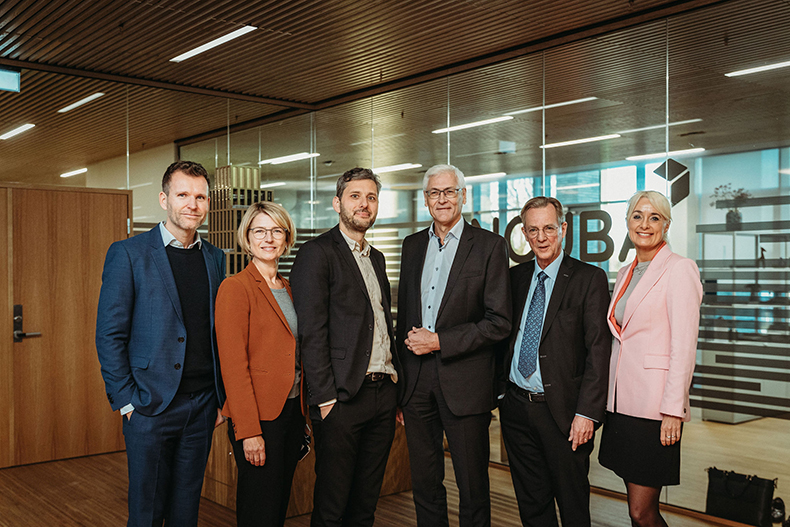‘One of today's biggest threats presents a billion-dollar opportunity for new industry’
The 18 November issue of the Danish newspaper Børsen reported that the CEOs of a number of the country's largest banks are now sounding the alarm due to a sharp increase in the number of cyber attacks. And the big banks are far from alone in this challenge.
According to TDC Erhverv, half of the country's large companies have been affected by cyberattacks, and according to the report Digital Security in Danish SMEs, almost 30 per cent of SMEs experienced IT security incidents in 2021. By all accounts, that proportion is higher today.
We're also seeing an increased focus on protecting our critical infrastructure, such as the transport sector and our energy and water supply, from cyberattacks.
In other words, it could just as easily be a cyberattack as traditional acts of war that means we Danes will need our prepping supplies. Cybersecurity is therefore a central part of Danish preparedness, which was also emphasised by the Centre for Cybersecurity becoming part of the new Ministry of Social Security and Emergency Preparedness, which saw the light of day at the end of August.
But this serious situation also presents an opportunity. According to a new analysis from Deloitte, the Danish cybersecurity industry could grow to DKK 13 billion within five to ten years. This would double the turnover of the industry, which currently employs 10,000 people.
Ecosystem is crucial
The reason is that over the years we have built some of the world's leading cybersecurity research environments at universities, where the ideas for future entrepreneurs are often hatched.
Today, the industry is particularly concentrated in Copenhagen and Aarhus. Aarhus is home to Denmark's largest IT and tech innovation environment under the auspices of IT Campus Katrinebjerg with the Department of Computer Science, but also Security Tech Space, a consortium of over 80 partners that serves as an important knowledge platform for cyber security.
Security Tech Space supports the industry by bringing together researchers, companies and public actors to develop and test innovative security solutions, which is crucial for both growth and resilience in the Danish cybersecurity industry.
In this ecosystem, we are now in the process of strengthening the bridge between research and industry, and not least between green entrepreneurs and forward-thinking inspirations.
On 21 November, we are expanding our science park with Incuba Next - a new 18-storey epicentre for cybersecurity and IT innovation, where some of the industry's new stars will live side by side and, not least, right in the middle of a single IT campus.
These include companies such as Coana, CrowdStrike and Partisia. Coana develops new solutions that protect against cyber threats, CrowdStrike offers endpoint security and threat intelligence, while Partisia works with secure data sharing.
The investment in Incuba Next is based on a belief in the Danish cybersecurity industry. The ambition is for public authorities, foundations and commercial players to build on the industry's already multifaceted ecosystem, so that cybersecurity in Denmark has a solid contingency plan and also a really good business.
From idea to business
As the Danish government wrote when they launched a new collaboration this autumn with the goal of strengthening entrepreneurial environments in Danish areas of strength, many innovative entrepreneurs hit the wall when their budding idea needs to become a rooted business.
In the scaleup phase, entrepreneurs need access to a unified ecosystem and players with deep professional insight, experience and capital to scale startups to global success. It's no coincidence that one after another leading tech company has risen from the same geographical area in Silicon Valley.
And it's no coincidence that Switzerland is now one of the leading nations in new cybersecurity technology through its Trust Valley, a public-private partnership in the Léman region that focuses on digital trust and cybersecurity.
We are therefore following the government's new collaboration on entrepreneurial environments with excitement and hope that it will lead to increased investment in cybersecurity. The Danish cybersecurity industry today is made up of specialised but still relatively small companies, and the industry is not yet large in an international perspective.
With the right ecosystem, where private companies, authorities and research and educational institutions work together to create optimal conditions, we can turn the industry's significant strengths in areas such as cryptology and communication and sensor technology into both growth and a strengthened critical infrastructure.

Chairman of the Board Peter Kjær - Executive Vice President at Schouw & Co.
Board member Jørgen Lang - Managing Director of Aarhus University Research Foundation.
Board member Thomas Riisgaard Hansen - CEO of DIREC (Digital Research Centre Denmark).
Board member Lone Ryg Olsen - Business Director at Aarhus University.
Board member Line Christa Amanda Sørensen - Chief Commercial Officer (CCO) at Trifork and Angel Investor.
Board member Kristian Thorn - University Director at Aarhus University.
Translated with DeepL.com (free version)